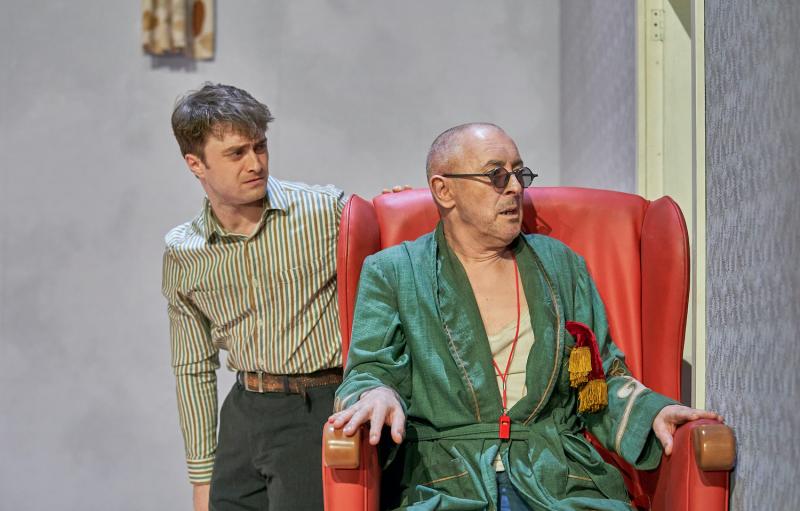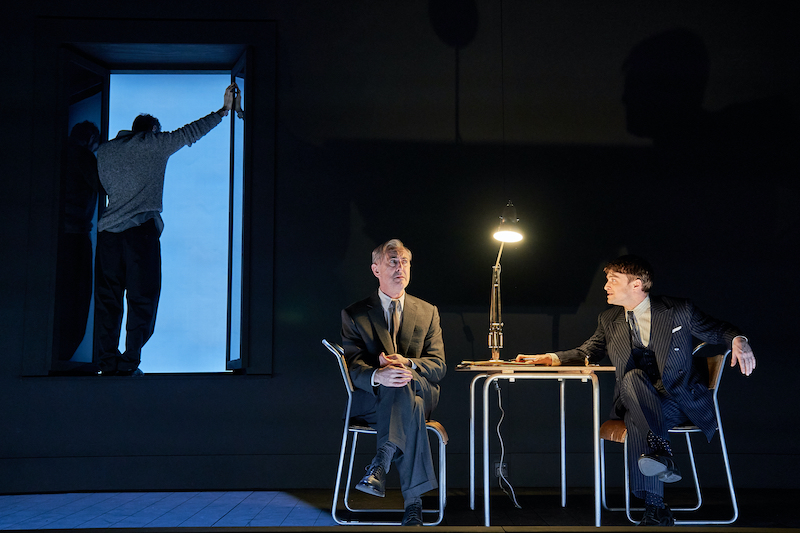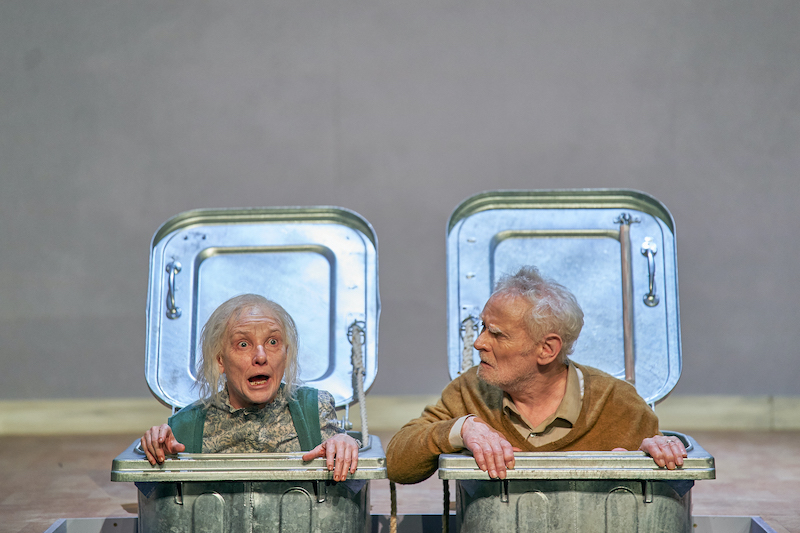Endgame/Rough for Theatre II, Old Vic review - Beckett played for laughs | reviews, news & interviews
Endgame/Rough for Theatre II, Old Vic review - Beckett played for laughs
Endgame/Rough for Theatre II, Old Vic review - Beckett played for laughs
Alan Cumming and Daniel Radcliffe lead a lively double bill

“Nothing is funnier than unhappiness.” Director Richard Jones has certainly taken Beckett’s words to heart in this vividly comic, star-cast Old Vic double bill, pairing Endgame with a lesser-known short play – which acts as a sort
We open with Beckett’s Rough for Theatre II, a half-hour vaudevillian sketch in which two dark-suited, bureaucratic colleagues (Alan Cumming and Daniel Radcliffe, pictured below) discuss whether or not a man will commit suicide; echoes here of both Pinter and Kafka. The man stands in a window frame, poised to jump, a stark silhouette against blinding white nothingness. The pair review the man’s life, from a grim childhood through to physical ailments and disappointments.
It’s a compelling double act, with Cumming’s blustering, motor-mouthed clerk testifying furiously like a lawyer performing for the court as he lists the man’s negative experiences with pedantic specificity, while the quieter Radcliffe offers eerily upbeat rejoinders – his tone, if not the content of his speech, staying unfailingly chirpy. However, when one of their desk lamps begins switching off independently, it’s Cumming’s character who shrinks, terrified, from the darkness.
 Cumming adds superb touches, whether savouring the despairing cry of editors everywhere as he sifts through dense writing to “find the verb”, brandishing a pencil with a Harry Potter wand-like flourish, or – when transferring his files to his colleague’s desk, nervous of upsetting another lamp – just softly nudging the documents onto the table with his groin. Radcliffe provides a good sounding board, but gabbles his own speech so that nuances are lost. In both this and the following Endgame, it’s his physical work that proves more effective. His Clov has a hunched, limping but still manic scuttle – like a crab dragging an injured limb – and he either wriggles or slides hurriedly down the ladder, each descent seeming more precarious. However, the mechanics of his performance are too evident.
Cumming adds superb touches, whether savouring the despairing cry of editors everywhere as he sifts through dense writing to “find the verb”, brandishing a pencil with a Harry Potter wand-like flourish, or – when transferring his files to his colleague’s desk, nervous of upsetting another lamp – just softly nudging the documents onto the table with his groin. Radcliffe provides a good sounding board, but gabbles his own speech so that nuances are lost. In both this and the following Endgame, it’s his physical work that proves more effective. His Clov has a hunched, limping but still manic scuttle – like a crab dragging an injured limb – and he either wriggles or slides hurriedly down the ladder, each descent seeming more precarious. However, the mechanics of his performance are too evident.
Cumming’s Hamm has prominent prosthetic withered legs and grotesque false teeth, undermining the way he lounges arrogantly on his throne-like chair; despite his despotic power games, we’re always aware of his physical limits. Again, it’s odd-couple farce, with this Hamm petulant, disdainful and cool (“Can there be misery loftier than mine?” he drawls), while Radcliffe’s apron-clad workhorse Clov staggers round the room with thudding footfalls, eyes wild and hair on end, heaving items and sweating profusely. In both pieces, there’s a hint of a queer reading (Cumming’s clerk craves Radcliffe’s “animal warmth”; “Kiss me,” purrs Cumming’s Hamm, plus the quite literal “I feel a little queer”) – though this is played purely for winking humour, rather than any deeper meaning.
Jones also stresses the meta aspects of these pieces. In the first, a red curtain is visible above the action, as a constant reminder that we’re in a theatre, and Cumming delivers many of Endgame’s lines directly to the audience as wry commentary – like the indisputable “This is slow work”. All of this is enjoyable in the moment, with Cumming holding court deliciously like a pouting minor royal, but pushing the work into broader territory risks making the cyclical existential despair feel bluntly repetitive, rather than increasingly agonising and insightful. Some of the more reflective sections barely engage, with the energy dipping between comic set-pieces, even though we get some fascinating echoes from the first piece in motifs like tough parenting or dying lamps plunging people into darkness.
 There’s also the slight problem that Jane Horrocks and Karl Johnson are so magnetic as the dustbin-housed parents, we really want more of them. Horrocks, almost unrecognisable in her ageing make-up and wig, controls the pacing of each interaction with marvellous precision, and though some of the gags are rather hoary (“Our hearing hasn’t failed.” “Our what?”), she and Johnson deliver them impeccably. There’s a wistfulness to their shared sighs over a mythical “yesterday”, when life was better, an aching poignancy to their tantalising physical separation, and a mingled tragicomedy in Johnson’s Nagg trying to engage her with a familiar funny story, only to see her slip away.
There’s also the slight problem that Jane Horrocks and Karl Johnson are so magnetic as the dustbin-housed parents, we really want more of them. Horrocks, almost unrecognisable in her ageing make-up and wig, controls the pacing of each interaction with marvellous precision, and though some of the gags are rather hoary (“Our hearing hasn’t failed.” “Our what?”), she and Johnson deliver them impeccably. There’s a wistfulness to their shared sighs over a mythical “yesterday”, when life was better, an aching poignancy to their tantalising physical separation, and a mingled tragicomedy in Johnson’s Nagg trying to engage her with a familiar funny story, only to see her slip away.
Stewart Laing’s set features the grimly institutional walls of an abandoned old folks’ home, tatty curtains framing an alarming post-apocalyptic blankness. Fergus O’Hare’s soundscape is likewise evocative, as is Sarah Fahie’s crisply structured movement. Given the draconian Beckett estate’s short-sighted refusal to allow real innovation in staging his work, this kind of stylised exaggeration is a savvy way around the restrictions. However, despite the timely references to environmental calamity, it does come at the expense of the real terror of mortality and the unknown void, and of the philosophical, delicately bleak poetry – which, when left to accumulate, can pierce the soul.
- Endgame/Rough for Theatre II at the Old Vic until 28 March
- Read more theatre reviews on theartsdesk
rating
Share this article
Add comment
The future of Arts Journalism
You can stop theartsdesk.com closing!
We urgently need financing to survive. Our fundraising drive has thus far raised £49,000 but we need to reach £100,000 or we will be forced to close. Please contribute here: https://gofund.me/c3f6033d
And if you can forward this information to anyone who might assist, we’d be grateful.

Subscribe to theartsdesk.com
Thank you for continuing to read our work on theartsdesk.com. For unlimited access to every article in its entirety, including our archive of more than 15,000 pieces, we're asking for £5 per month or £40 per year. We feel it's a very good deal, and hope you do too.
To take a subscription now simply click here.
And if you're looking for that extra gift for a friend or family member, why not treat them to a theartsdesk.com gift subscription?
more Theatre
 Interview, Riverside Studios review - old media vs new in sparky scrap between generations
Robert Sean Leonard and Paten Hughes make worthy sparring partners
Interview, Riverside Studios review - old media vs new in sparky scrap between generations
Robert Sean Leonard and Paten Hughes make worthy sparring partners
 Fat Ham, RSC, Stratford review - it's Hamlet Jim, but not as we know it
An entertaining, positive and contemporary blast!
Fat Ham, RSC, Stratford review - it's Hamlet Jim, but not as we know it
An entertaining, positive and contemporary blast!
 Juniper Blood, Donmar Warehouse review - where ideas and ideals rule the roost
Mike Bartlett’s new state-of-the-agricultural-nation play is beautifully performed
Juniper Blood, Donmar Warehouse review - where ideas and ideals rule the roost
Mike Bartlett’s new state-of-the-agricultural-nation play is beautifully performed
 The Gathered Leaves, Park Theatre review - dated script lifted by nuanced characterisation
The actors skilfully evoke the claustrophobia of family members trying to fake togetherness
The Gathered Leaves, Park Theatre review - dated script lifted by nuanced characterisation
The actors skilfully evoke the claustrophobia of family members trying to fake togetherness
 As You Like It: A Radical Retelling, Edinburgh International Festival 2025 review - breathtakingly audacious, deeply shocking
A cunning ruse leaves audiences facing their own privilege and complicity in Cliff Cardinal's bold theatrical creation
As You Like It: A Radical Retelling, Edinburgh International Festival 2025 review - breathtakingly audacious, deeply shocking
A cunning ruse leaves audiences facing their own privilege and complicity in Cliff Cardinal's bold theatrical creation
 Edinburgh Fringe 2025 reviews: Refuse / Terry's / Sugar
A Ukrainian bin man, an unseen used car dealer and every daddy's dream twink in three contrasting Fringe shows
Edinburgh Fringe 2025 reviews: Refuse / Terry's / Sugar
A Ukrainian bin man, an unseen used car dealer and every daddy's dream twink in three contrasting Fringe shows
 Faustus in Africa!, Edinburgh International Festival 2025 review - deeply flawed
Bringing the Faust legend to comment on colonialism produces bewildering results
Faustus in Africa!, Edinburgh International Festival 2025 review - deeply flawed
Bringing the Faust legend to comment on colonialism produces bewildering results
 Edinburgh Fringe 2025 reviews: Imprints / Courier
A slippery show about memory and a rug-pulling Deliveroo comedy in the latest from the Edinburgh Fringe
Edinburgh Fringe 2025 reviews: Imprints / Courier
A slippery show about memory and a rug-pulling Deliveroo comedy in the latest from the Edinburgh Fringe
 Edinburgh Fringe 2025 reviews: The Ode Islands / Delusions and Grandeur / Shame Show
Experimental digital performance art, classical insights and gay shame in three strong Fringe shows
Edinburgh Fringe 2025 reviews: The Ode Islands / Delusions and Grandeur / Shame Show
Experimental digital performance art, classical insights and gay shame in three strong Fringe shows
 Edinburgh Fringe 2025 reviews: Ordinary Decent Criminal / Insiders
Two dramas on prison life offer contrasting perspectives but a similar sense of compassion
Edinburgh Fringe 2025 reviews: Ordinary Decent Criminal / Insiders
Two dramas on prison life offer contrasting perspectives but a similar sense of compassion
 Edinburgh Fringe 2025 reviews: Kinder / Shunga Alert / Clean Your Plate!
From drag to Japanese erotica via a French cookery show, three of the Fringe's more unusual offerings
Edinburgh Fringe 2025 reviews: Kinder / Shunga Alert / Clean Your Plate!
From drag to Japanese erotica via a French cookery show, three of the Fringe's more unusual offerings
 The Two Gentlemen of Verona, RSC, Stratford review - not quite the intended gateway drug to Shakespeare
Shakespeare trying out lots of ideas that were to bear fruit in the future
The Two Gentlemen of Verona, RSC, Stratford review - not quite the intended gateway drug to Shakespeare
Shakespeare trying out lots of ideas that were to bear fruit in the future

Comments
You are right that the